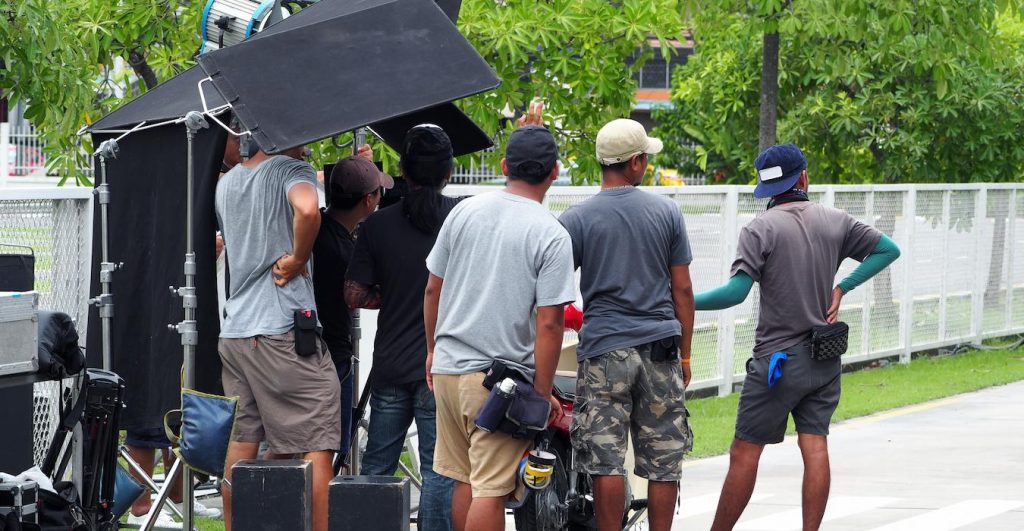While actors may get their names in lights and directors can become world-renowned for their films, there are certain individuals responsible for making sure a movie gets made.
A production manager connects the many moving pieces of a film. They are a little bit like The Dude’s rug in The Big Lebowski, which really tied the room together. So when you’re thinking about the role of a production manager, remember The Dude’s rug, but to develop a better understanding of the full job description, be sure to read below about all responsibilities they have on set and in the production office.
See Related: What Is Production Design in a Film?
Understanding the Role of a Production Manager
A production manager, often referred to as a unit production manager (particularly on union projects, and by the Directors Guild of America), is responsible for managing many of the ins-and-outs of a film production. They oversee the budget, the hiring, the shooting schedule, and all the business aspects of a film project. Production managers are involved with a film through every stage of production, from pre-production, to budgeting out film insurance, to principal photography, to post-production.
During each stage of production, the production manager will work closely with the film’s producers (particularly the line producer, who may be the one to initially set the budget), the directors (particularly the first assistant director or 1st AD, who is generally in charge of all the department heads), as well as others involved with the film. Typically the production manager is hired by the producer and then reports directly to the line producer. On a smaller film production, the positions of production manager and line producer might be consolidated, as many of the duties are similar.
Responsibilities of a Production Manager
As hinted at above, a production manager wears many hats. Their duties include budgeting and hiring, and keeping all the proverbial plates spinning so that productions run smoothly. Let’s get into a little more detail on each of these to get a better sense of what production management looks like on the daily.
Budgeting
A production manager creates a budget, or oversees the budget that a producer may put in place. A film’s budget will take into account everything from paying personnel to purchasing equipment. If there are travel and lodging or on-location costs including booking a sound stage, the production manager is the person responsible for making sure it’s all staying within budget.

This is a big job, but luckily, in the film and television industry, the production manager has help. The production accounting team usually works just down the hall in the same production office.
They maintain financial records and keep production managers informed about where they are concerning the budget on a regular basis. Production accountants keep track of petty cash and process payments, but the production manager must approve and sign all the checks.
Hiring
The production manager’s duties include hiring the crew and executing employment contracts for the film production as well. In film production, it’s important to have an in-depth knowledge of union rates and agreements, as well as other aspects of negotiating contracts.
Casting directors are primarily in charge of selecting the actors, but production managers hire all those involved with the rest of film production, like catering, the accounting team, production assistants, and most of the remaining crew. These jobs that are more logistical or administrative are often referred to as below the line.
Bonus: How To Start A Film Production Company
Scouting & Securing Locations
While it’s the job of the location scout to find the perfect places for shooting the film, production managers must oversee the process and approve payments to secure the locations. So while the production manager might not be driving all over Los Angeles on a search for the right spot, figuring out the filming locations including production studios on time and on (or under) budget is an important part of the job.
For each location, the necessary permits and releases must be secured. Again, the production manager may have help with these and other related administrative tasks. A production assistant or production coordinator may be the one to arrange for the permitting, but the production manager is the key person who is ultimately responsible.

Shooting Schedule
It’s the job of the production manager to coordinate with producers in order to make a shooting schedule. A producer may have already worked out a rough shooting schedule after carefully sifting through the script.
The production manager will be the one to ensure that the shoot works with the schedules of the cast and crew, and that the location is secured for the appropriate length of time. It’s of utmost importance to create a schedule that works for everyone and which adheres to the budget.
What it Takes to Become a Production Manager
If you’ve perused the job description and other details above and aren’t overwhelmed at the prospect of production management, then you may just have what it takes for this career. To be more specific about the requirements you need to meet all the responsibilities mentioned, let’s go over a few concrete skills and the type of training that is helpful to have if you want to become a production manager.
As you may have noticed, many of the tasks require organization and creative managing skills. There is a lot going on during a film, and whether it be arranging an on-location shoot or coordinating the ever-evolving needs of your cast and crew, it’s critical to be organized.
Because budgeting is such a central part of the job, whether you’re in pre-production or post, you’ll also need an excellent understanding of budgeting and accounting. There is no degree required for most of these production jobs, though many people have gone to film school or have degrees in theater or related subjects. Knowledge of the film industry is key, but higher education isn’t the only way to get there.
Some folks work their way up from production assistant or office assistant jobs in order to hone their skills. People gain experience along the way. Before becoming a production manager, production coordinator would be the position to prepare you for what comes next.
To better understand what the day to day work environment is like for someone who currently has this career, you can check out this video of Heidi McGowen, production manager for the popular television show Blackish (who has a lot of experience in the industry, working on many other film and television shows).
Keep Reading: What is “montage” in the Hollywood sense of the word?
–
Mack Sennett Studios is a historic full-service photography studio, production sound stage, and private event space in Silver Lake, serving as creative home to the Los Angeles cultural renaissance for the last 100 years. Check us out on Facebook, Twitter, Vimeo, Pinterest, Yelp and Instagram.




